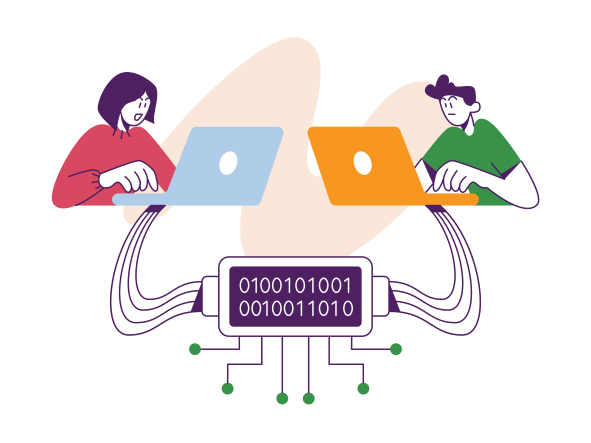How CoinJoin improves the privacy of your Bitcoin
If you ask a random person on the street about Bitcoin, he might say, “Isn’t that for thieves?” Even though Bitcoin has an open ledger where all on-chain transactions can be seen by anyone, this common misunderstanding still exists.
Even though Bitcoin transactions are private, it’s getting harder and harder to stay anonymous. The fact that a Bitcoin wallet address is pseudonymous makes it easier to link it to personal information. The history of transactions for a certain amount of bitcoin can be tracked back to different people. Most small investors buy Bitcoin through exchanges, which are required by law to collect “Know Your Customer” (KYC) information. This centralization of personal information means that it can be given to the authorities if they ask, or it can be hacked. Who gets to use this information in the future is still unknown. Companies that offer chain-analysis services can find out how different coins and wallets have been used in the past. Even non-experts who are patient and know a little bit about technology can follow transactions to find out who is behind a wallet address.
Even though Bitcoin itself doesn’t have a way to prove who you are, the real information about you will be outside of the blockchain. When you realise that the whole blockchain, including all its transactions, will always be public and will never go away, it becomes clear how important privacy tools are. Would you really want the world to know who you bought things from, who you gave money to, who you got things from, and how much money was in your wallet now, or in twenty years?
One of the most popular tools made to keep your privacy on an open digital ledger is Coinjoin. It is a peer-to-peer protocol that can hide the people behind transaction data if it is used correctly. To make a single transaction, Coinjoin needs several users to join their transactions together. A transaction on a certain amount of Bitcoin is signed by more than one person. The different UTXOs (unspent transaction outputs) that make up Bitcoin are “mixed” by the coinjoin protocol, and each wallet will get back the same amount of money that was put in. This makes it harder to figure out where the individual UTXOs came from.
So, what are the benefits, and why might someone want to use Coinjoin? Here, BitcoinNews.com gives you 8 reasons why you might want to use Coinjoin to send and receive Bitcoins.
You’re being watched by Big Brother.
There are now and will continue to be more laws passed by the government. Exchanges have to follow many of the same licensing rules as traditional banks, such as the Know Your Customer (KYC) and Anti-Money Laundering (AML) rules. The centralized collection of this data is a problem for privacy for anyone who wants to be their own boss. Even though rules are needed, especially in such a new market, the government can always go too far. Once someone gives up their privacy, it can be hard to find them again. Financial privacy gives people and, by extension, society more power. Money that is really sound and isn’t controlled from the center has always helped societies grow and prosper. Since the beginning of Bitcoin, people have said, “Not your keys, not your crypto.” More and more, keeping your financial health and history private, as well as your private keys, can protect you from changing political situations.
Should I tell the cashier how much money I have when I buy coffee?
Coinjoin lets you spend Bitcoin without the person getting the money knowing where it came from. How would this be a good thing? Let’s say I have a wallet with 5 bitcoins in it. Then, I used this wallet to send 0.05 btc to a person. The person who received the bitcoins could look at the bitcoin chain after the transaction and see that the sender’s wallet has 5 bitcoins in it. But in this case, using coinjoin would show that the sender’s address holds a much smaller amount. Also hidden would be the history of the UTXOs that made up the 0.05 btc. Spending anonymously lets bitcoin keep the privacy of transactions that we already use every day. If I buy a coffee at Starbucks, I don’t expect the vendor to know how much money I have in my account or what I’ve bought in the past. Both the sender and the receiver are protected by privacy.
Non-custodial, or not your keys and not your crypto
Users do not have to give up control of their money to use Coinjoin. You don’t have to believe a third party. By removing counter-party risk in a centralised party, coinjoin is a good choice for people who aren’t very good with technology. Privacy isn’t just for tech nerds, and the more people who use coinjoin, the more privacy wallets and transactions have. Recent things that have happened with companies that offer custodial services show how important trustless models that don’t involve custodial services are. A centralised custodial lending platform called Celsius recently stopped all customer withdrawals and went bankrupt. As if that wasn’t bad enough, related court proceedings made public the names of everyone who had an account. As we move further into a digital world, more and more privacy will be at risk.
Bad coins and preparing for the future
Privacy is a big deal these days. It’s also important for the future, which we can’t see. Situations change, governments come and go, and rules get stricter. Centralized authorities could try to limit Bitcoin’s freedom by banning certain coins that are linked to people or groups that may be seen as bad in the future. Who knows, maybe that wallet you got Sats from three years ago is now a problem, making you a problem by association. Fungibility is an important part of any form of currency, but Bitcoin has a hard time achieving it on its own. Simple conjoin transactions help bring back fungibility and make Bitcoin’s privacy stronger.
Coinjoin is a protocol that doesn’t start from scratch.
Because Coinjoin is a trustless protocol for mixing UTXOs from multiple owners, it can fit into Bitcoin’s current architecture without requiring any major changes to the code. Aligning with the code that is already there is becoming more and more important as Bitcoin gets older and improvement protocols get harder to implement. As privacy-focused wallets grow and change, they will do so in a way that makes sure they follow open-source, trustless principles.
Everyone is welcome
Everyone should be able to use decentralized tools for privacy. As a result, many easy-to-use coinjoin implementations have come out to help with something that may seem hard to do technically. Open-source desktop wallets like Wasabi have easy-to-use interfaces and, most importantly, don’t keep your private keys. This means that users stay in control of their own money. All of the new wallets fit into Bitcoin’s design because they are open-source and don’t require trust. Along with coinjoin, they also use TOR and block-filtering to hide who is involved in a transaction. The market for these kinds of wallets is growing because people want them. It will include wallets with more features, like the Mycelium wallet. The focus is on security and trustless design to give people as much privacy as possible.
Wallet privacy and the rights of people
By breaking the connection between a person and a pseudonymous wallet address, coinjoin is a technology that helps people thrive and feel good about themselves. It gives people the power to decide how and when their personal information is shared with other people, if at all. This privacy gives people a place to grow into who they really are. And once this privacy is protected, it lays the groundwork for other human rights like the right to speak, think, gather, and worship as you wish. These rights are the most important part of a democracy.
Comparing Decentralized and Centralized
Coinjoining can avoid the risks that come with centralised mixers because it is a decentralised protocol that doesn’t need to change the core of Bitcoin. In these situations, there is no guarantee that you will get back the full amount of Bitcoin you put in. Also, that the coins that are given back won’t be spoiled in some way. Governments can shut down centralised services, like they did with the Whirlpool mixer not too long ago. In this case, not only was the site shut down and the people who made it went to jail, but wallets that had used the mixing site in the past were also blacklisted. A decentralised coinjoin transaction creates enough plausible deniability to make it hard to link a person to a transaction.
In short, CoinJoin can’t promise privacy. But it can make it better in ways that haven’t been seen in Bitcoin before. And in an open-source environment where no one can be trusted, it can give each person the power to work for a better future. As our lives become more and more digital, we will have less and less privacy. As technology creeps into every part of our lives, these tools will help the average person take charge of his personal information.

